|
This section contains 896 words (approx. 3 pages at 300 words per page) |

|
Rabindranath Tagore was an Indian writer and philosopher. Romain Rolland, referring to the Orient and the Occident, said that Tagore contributed more than anyone else toward "the union of these two hemispheres of spirit." Sarvepalli Radhakrishnan called Tagore "the greatest figure of the Indian renaissance."
Tagore was born in Calcutta, studied in London, returned to India, and was married in 1883. He founded Visvabharati, a university at Santiniketan (near Bolpur), became India's most popular poet, won the Nobel Prize for literature in 1913, and was knighted in 1915. He visited and lectured in Canada, the United States, South America, England and several countries of Europe, the Soviet Union, Turkey, Iran, Ceylon, China, and Japan. He was in personal contact with Henri Bergson, Benedetto Croce, Albert Einstein, Bertrand Russell, and other leading intellectual figures of his period.
Tagore wrote about fifteen books of philosophical lectures and essays, about...
|
This section contains 896 words (approx. 3 pages at 300 words per page) |

|


